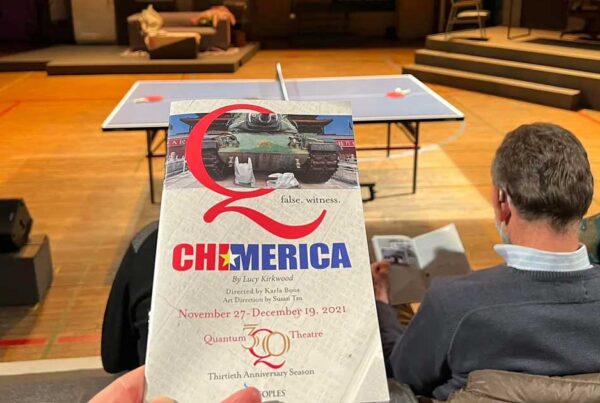
onStage Pittsburgh – It is often said that great writing begins with a question. As our world becomes increasingly globalized, digitized, but also volatile, questions related to public memory, heroism, censorship, and the importance of historical interpretations move from the background of our collective narrative to the foreground of our behaviors and daily interactions.
These questions are explored throughout Lucy Kirkwood‘s 2012 play, Chimerica, which runs at the Quantum Theater through December 19.
Directed by Karla Boos, Chimerica presents a multi-cultural cast that beautifully navigates the gravity of the events of June 4, 1989, or “6/4,” at Beijing’s Tiananmen Square. But it also questions the impact of public memory and the notion of progress.
The play begins with a photographic journalist, Joe (Kyle Haden), on the phone with his American boss as he watches the June 4 protests unfold from his hotel room in Tiananmen Square. Recognizing the magnitude of his historical moment, Joe captures what becomes the now-iconic image of “tank man” before narrowly escaping Chinese guards who are infiltrating his hotel. The “tank man” photo shows a single male, carrying two shopping bags, boldly standing in front of Chinese military tanks, which sought to forcefully remove protestors from the square on that fateful day.
However, while that photograph has no doubt become an iconic image of the power of protest, human rights, heroism, and progress, Kirkwood’s play invites audiences to consider the implications behind the photograph. Who is “tank man?” Is he alive? How has photographic journalism evolved in a digital era? What, if any, is society’s responsibility to honor and remember that photo and the People’s Republic of China’s movement? How has China’s society evolved since 1989, and how has their progress impacted their relationship with America?
Through two 65-minute acts, Chimerica travels between America and China, following Joe’s pursuit to find “tank man” and write a feature article about where he is now, what happened to him after his heroic stance, and also answer lesser-thought of questions, such as “what was in the grocery bags he clung to so tightly in the face of not just adversity, but his potential death. Haden’s portrayal of Joe is nuanced yet profound, but each actor portrayed a character grappling with their own insecurities, loneliness, and commitment to the establishment as many seek refuge in alcohol to cope with their deep-rooted emotions.
His travels led him to interact with colleague Mel Stanwyck (Jason McCune), his boss Frank (John Shepard), and friend turned love interest Tessa (Alison Weisgall). However, Joe’s most important relationship is with his friend, Zhang Lin (Hansel Tan), whom he visits when he travels to Lin’s home in Beijing. Tan delivers palpable emotion in his portrayal of Zhang Lin, a widowed activist for the People’s party. Still attempting to reconcile the traumas of his past, Zhang Lin represents the importance of citizens remaining vigilant despite any positive notion of progress.
Ensemble members are tasked with portraying a myriad of characters, but perhaps the most successful actor at this venture was Elena Alexandratos, whose commanding interpretation of Maria, a tenacious Senator, made audiences consider the ethics and influence of American politicians.
Boos interpreted Kirkwood’s script by weaving an intricate maze of both Eastern and Western culture with references to Western media outlets, politicians, and phrases, but also a critical look of immigrant culture in NYC. There are also pockets of traditional spoken Mandarin throughout the script, traditional Chinese music, and references to baozi (traditional Chinese food) and guanxi (influential relationships), among other elements of Chinese culture. This integration of two diverse cultures serves to drive the overarching themes of Chimerica. The play is set in 2012 during Obama’s reelection campaign and ultimate victory over Senator Mitt Romney. With social media still young in 2012, Chimerica offers an early expose into how the internet can compromise our perception of the “truth” and questions America’s relationship with China and Chinese immigrants.
Another theme, how government corruption leads to citizen and media censorship, resonated as timely for the play, but also timeless as we continue to confront arguments over censorship and question both government and media transparency today.
A standout moment comes toward the end of the second act when Tessa gives a presentation for her job in which she seeks to profile the habits of the Chinese consumer. This seemingly simple presentation becomes an emotionally driven, thought-provoking climax as Weisgall’s quiet, non-verbal response to her own presentation proves just as rhetorical as her intense monologue.
Ultimately, Chimerica is a thought-provoking commentary on the geopolitical relationship of China and America, but also the intricacies of humanism embedded in the crevices of two proud countries still trying to navigate an identity in the digital era.




